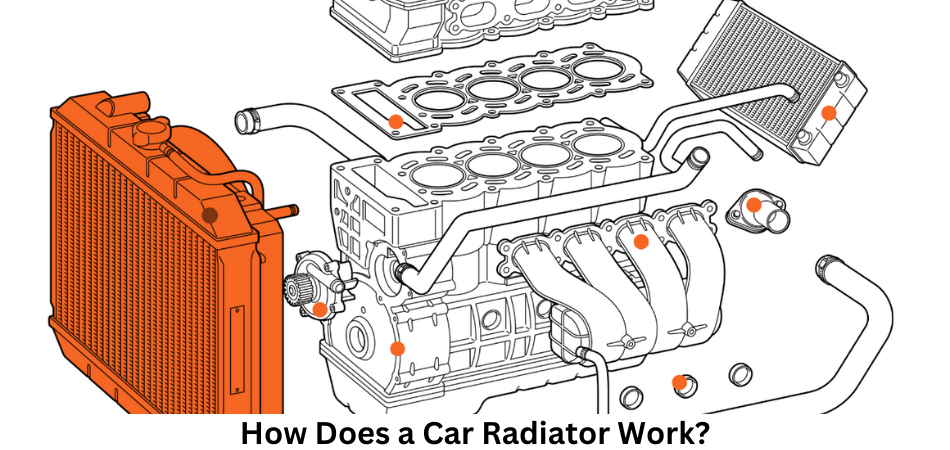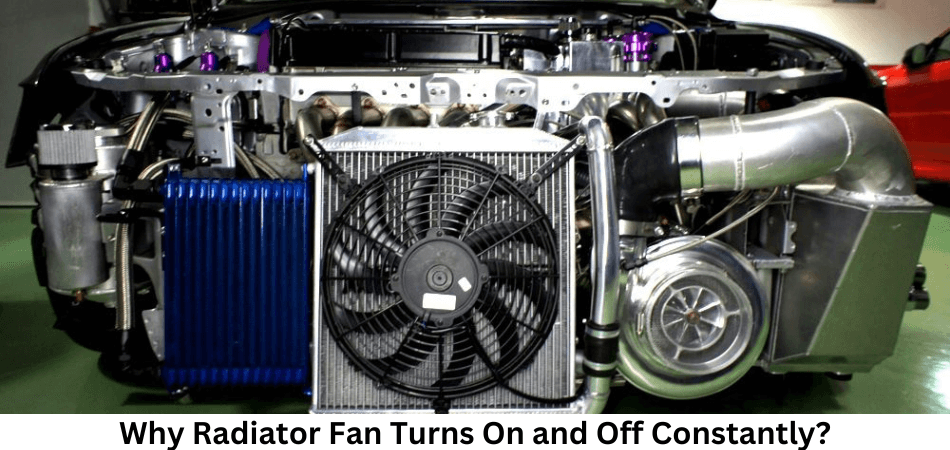
It is crucial for the proper functioning of your car’s radiator fan. Your car’s components are protected from overheating by this device. It’s natural to feel concerned when it suddenly turns on and off. But Why Radiator Fan Turns On and Off Constantly?
If your radiator fan is constantly turning on and off, this may be an indication of a problem. In order to dissipate heat, the radiator fan draws air through the radiator. There may be an underlying issue that needs to addressed if it operates erratically.
A radiator’s purpose and function will explained in this article. We will also explain Why Radiator Fan Turns On and Off Constantly under normal circumstances. We’ll conclude by helping you determine whether your radiator fan going on and off is a sign you should troubleshoot your car.
How Does a Car Radiator Work?
The internal combustion engine of your car allows it to move around. The internal combustion engine generates heat by generating energy. Car radiators prevent dangerous levels of heat from being generated by your engine.
Overheating of your engine prevented by a car radiator. To transfer heat from the engine to the surrounding atmosphere, it uses the principle of convection. In order to operate, the radiator relies on a complex system of thermostats, coolants, and fans.
It is not necessary to worry if your car’s temperature increases. In some cases, however, high temperatures can damage the internal components of your vehicle. It is here that your car’s radiator comes into play.
Understand car heat generation
In order to understand how your car’s radiator works, you must first understand how it generates heat. Your vehicle runs on an internal combustion engine.
If A piston moves inside a cylinder in an internal combustion engine. Combustion gasses pushed into the cylinder, which moves the piston, which drives your car’s complex gear system. As a result of this process, a lot of energy generated, and when there’s enough energy in one place, it heats up.
A car engine’s temperature should be between 195 and 220 degrees Fahrenheit (91 to 104 degrees Celsius). Your thermostat activates the radiator fan when the engine temperature exceeds that level.
Radiators release liquid coolant and water that absorb heat
When your radiator activates, liquid coolant and water released. Coolant and water play a crucial role in keeping liquid from entering your engine. Before returning to the radiator, both absorb excess heat from your engine.
Radiators transfer heat away from engines
A radiator’s fan cools the heated coolant and water once they return to the radiator. This process transfers heat from the engine to the air outside the vehicle.
When the job is complete, the radiator turns off
As soon as your engine’s temperature drops below a defined threshold, the coolant’s heat dissipates into the atmosphere. When this happens, the radiator fan will shut off, and the radiator will stop pumping coolant. A similar cycle will repeat if the engine’s temperature reaches a critical level again.

What Are the Signs That Your Radiator Fan Is Working Properly?
In Most of the time, a car radiator fan turning on and off isn’t a cause for concern. If anything, it’s a sign that the radiator is functioning properly. Without your knowledge, your car will overheat and be damaged.
In the absence of other signs of damage, you will be able to tell whether the car radiator fan is working properly. Your car radiator fan is safe to drive if there is no smoke coming from underneath the hood or the engine temperature gauge does not reach “high.”
On On the other hand, your radiator fan may turn on and off when something is wrong with your car. If that’s the case, how do you know? You’ll learn how to tell if your car radiator isn’t working correctly in the next section.
When your car radiator turns on and off, there’s a problem with it. The proper way to fix your radiator depends on what’s wrong with the vehicle, so it’s important to recognize these signs.
- Symptoms of a malfunctioning car radiator include:
- Despite high temperatures, the radiator fan does not turn on.
- There is no way to turn off the radiator fan, so it remains permanently on.
- The engine of your car is constantly overheating.
- Coolant leaks or does not pump.
Is the cooling fan switch responsible for a fan that keeps going on and off?
Fans that keep turning on and off controlled by the cooling fan switch. The cooling fan switch can fail, causing the fan to turn on and off repeatedly, causing overheating and damage to the engine.
If The cooling fan switch in your car needs to replaced if it is malfunctioning. It’s a relatively easy task that almost anyone can complete.
You will need to open your car’s hood to replace the cooling fan switch. When you open the hood, you will see the fan assembly. There are two wires that attach to the cooling fan switch, which located on the left side of the fan.
The switch should removed from the fan by carefully removing the wires from it. Go to an authorized mechanic if you are not sure you can do this job.
After removing the old switch, install the new one by reversing the steps you used to remove it. You should then close the hood of your car after attaching the wires to the switch. Make sure that the fan is now functioning properly. Mechanics can assist you further if it isn’t.
Are radiator fans controlled by the ECU?
Yes, the ECU controls the radiator fan. A malfunctioning ECU can cause the fan to turn on and off constantly. It can be difficult for drivers to figure out what is causing the problem, which can be frustrating.
A mechanic should inspect your vehicle if you are experiencing this issue. The fan may be turning on and off due to an ECU problem or another issue. You can restore smooth operation to your car by identifying and fixing the problem.
Is it necessary to turn on the radiator fan on a regular basis?
It is recommended that the radiator fan runs every time the engine is running. In addition to keeping the engine cool, the fan also keeps the passengers cool. The engine can overheat if the fan does not come on, which can cause serious damage. When the air conditioning turned on, the fan should also come on. As a result, the air conditioning system runs more efficiently.
Can I check if the radiator fan is bad without removing it from the engine?
It is possible to check if the radiator fan is bad without removing it from the engine. Listening to the fan while it runs can help you do this.
When you hear a high-pitched squealing noise, the fan is probably broken and needs to replaced. You can also check by feeling the air coming out of the fan.
If the air is hot, then it is likely that the fan needs to replaced. The blades of the fan can also checked for damage. The fan should replaced if any of the blades bent or broken.

Why Radiator Fan Turns On and Off Constantly?
A Radiator fan dissipates heat generated by the engine and regulates the engine’s temperature. It switches on and off sporadically in its optimum state. It switches on and off sporadically in its optimum state. But Why Radiator Fan Turns On and Off Constantly?
Whenever the engine becomes too hot, the radiator fan kicks on to cool it down, and then it is automatically turned off so that the engine can return to normal. It constantly happens whether the vehicle is moving or static. Radiator fan systems can, however, become faulty quickly, turning on and off at inconvenient times.
Here are some of the most common causes of this error and how to fix them.
1. Problems with the thermodynamic loop
When airflow limited in the vehicle, the radiator fan regulates the engine’s heating. In thermodynamics, the cooling effect called a thermodynamic loop.
The heat generation rate of a car at rest is usually lower than that required for maintaining the refrigerant flow.
However, the temperature fluctuates according to the refrigerant levels in the reservoir and the motion of the vehicle.
The radiator fan maintains a specific temperature range for the coolant when there is poor airflow in the engine.
Solution
A mechanic can determine the source of the problem by checking the thermostat and all the heating systems.
2. A bad fan control module
Each car has its own radiator fan control module, which is usually found in the engine bay. The environment will affected if it is harsh.
The module would wear and rust as a result.
Solution
- Look for physical damage to the relay’s exterior. Make sure the interior is in good condition and that the soldering is not damaged.
- You may be able to repair and then solder these if necessary. There may be a need to replace the module in severe cases.
3. A Bad Thermostat
Radiator fans need a thermostat to remain useful. As well as controlling engine water levels, the thermostat regulates the temperature of the engine. Temperature controllers are prone to damage on their interior frozen parts and exterior springs. By redirecting the radiator fan circulation, such damages could cause ants to freeze. There is a change in cooling effect when a thermostat malfunctions.
Solution
- It is easy and affordable to repair a car thermostat. This will usually solve an overheating problem, saving you the energy and cost of a specialist diagnosis.
- It’s a good idea to change the thermostat once you have updated your car’s air conditioning system.
- As Whenever you update your car’s air conditioner or heater, inspect the thermostat and replace it.
- If Replace your car thermostat as soon as possible if it exhibits poor car thermostat symptoms. The thermostat sensor should also fixed.
- The thermostat may function normally again after using this method.
4. A blown fuse
An automobile’s electrical components protected by fuses. If When an electrical shock strikes a piece of digital hardware, a fuse shuts off the power, preventing it from destroyed. A blown fuse referred to as such.
Solution
- It’s not a huge deal to replace a blown fuse, and it’s not expensive either. Find the radiator fan controller or fan fuse in the owner’s manual.
5. Faulty Coolant Temperature Sensors
In some cars, the radiator fan controlled by a separate fan control module rather than the engine control module. In the case of a faulty coolant temperature sensor, a cold signal will be consistently displayed. The radiator fan activated by this status.
Solution
- The radiator fan’s particular type of control can found in the car’s service manual. Check the sensor’s functionality using a multimeter.
- Consult your mechanic if you have any questions. If you want to know which temperature sensor operates the radiator fan, check your service manual.
- Make sure the sensor works properly by measuring its resistance with a multimeter.

6. A broken wire or connection
Disconnected wires may be causing the fan to turn on and off irregularly.
Solution
- At the control unit and switch levels, inspect the wiring. Make sure the plugs are in good condition as well.
- In order to determine the flow of electricity, the mechanic must measure the cabling with a multimeter. Fix the disconnection’s source.
7. Coolant levels drop below a certain level
Overheating of the engine caused by low levels of coolant. In order to cool the engine again, the radiator fan will turned on. It Maintains the engine temperature by dissipating the generated heat. The radiator fan’s performance will hindered by coolant levels below a cut-off point, however.
Solution
- Keep an eye on the coolant level to make sure it is not depleted. It may be necessary to top up or replace the coolant entirely.
8. A clogged filter
A clogged air filter will cause overheating in the engine due to restricted airflow, causing the radiator fan to turn on and off to reduce the temperature.
Solution
- Make sure the filters are de-clogged or replaced by a mechanic.
9. A broken radiator fan belt
There are times when the fan belt may cut, loosen up, or slag off completely. A snapped belt will prevent the fan from cycling. No Poor air circulation causes cycling to cause excessive heating. A radiator fan that ticks on and off uncontrollably can triggered by this scenario.
Solution
- Belt replacement is necessary.
- Engaged air conditioner compressor
- When the AC compressor engaged, the radiator fan may triggered.
- Radiator fans circulate air within the AC condenser to prevent overheating and enhance its performance.
- Nevertheless, this depends on the type of car and the radiator fan in the engine. There are fewer radiator fans in smaller cars, while there are more in larger cars.
- For cars with one radiator fan, the radiator fan may need to be continuously turned on to keep the AC running.
- It is possible that the AC will not dissipate all of the heat generated if the radiator fan is not turned on.
- As a result of the smaller size and location of the AC condenser, the cooling effect is less than optimal.
- This AC attribute is independent of the car’s motion status. Both moving and static cars operate according to the same principle.
- Despite differences in temperature, the AC set-up maintains almost constant heat circulation. As a result, radiator fans used to cool air conditioners.
10. Faulty Electronic Control Units (ECUs)
A car’s engine powered by its electronic control unit (ECU). To ensure the smooth operation of a car’s electrical system, it regulates the electrical system. An abnormality in the ECU can cause the radiator fan to run uncontrollably. As a result, the radiator fan’s function moderated by the ECU. In order to connect radiator fan problems to ECU problems, you need skills and expertise.
Solution
- Repairing or replacing the ECU is the solution. In contrast to a total replacement, which is capital intensive, the parts and repair of ECUs are costly.
- Due to a lack of skilled professionals in the area, it may be difficult to get an expert to repair or reprogram the ECU. Online repair services are now available from some mechanics.
- Through this method, you can contact an expert. Their workshop receives the ECU.
- It repaired and sent back to you without your physical presence.

11. Faulty Cooling Fan Switches
In order to regulate cooling effects, the cooling fan switch toggled on or off. Activation of the radiator fan could caused by damage to the cooling fan switch.
Solution
- The cooling fan switch needs to replaced. Check the fan system under the hood of the car first.
- There are two wires attached to the cooling fan switch, located on the left side of the fan. The switch must detached and the wires must be disconnected.
- In reverse order, replace it with the new one while reversing the removal process. It is best to consult an expert mechanic, however.
- A new cooling fan switch will installed by the mechanic after the damaged switch is carefully removed.
- It is mainly the skill of connecting the two wires in the switch correctly that makes a professional.
Solution alternatives
- You may need to manually control the radiator fan’s operation to ensure it runs continuously without errors. The fan controlled by a manual switch.
- Manual switches should located on the ignition switch side, not at the battery connection. Upon turning off the ignition, the fan will turn off.
- Fixing the manual switch, however, may result in the fan running continuously against ignition. Water temperature controlled by the thermostat.
- Repairing a radiator fan that turns on and off is best left to a mechanic. In addition to diagnosing the errors and addressing them appropriately, they trained to fix them.
Can a radiator fan that keeps going on and off caused by a bad thermostat?
An intermittent radiator fan can caused by a faulty thermostat. A malfunctioning thermostat cannot tell when to turn on and off the radiator fan. As a result, the fan may turn on and off constantly, which can be annoying and frustrating.
A professional should check the thermostat to see if it needs to replaced if you are experiencing this problem.
Thermostats are inexpensive to replace, and they can save you money on energy over time. You should consult a heating and cooling specialist if you are not sure whether your thermostat is malfunctioning.
As the engine attempts to maintain a specific temperature, the radiator fan turns on and off continuously. To cool down the engine, the radiator fan comes on when it gets too hot. In order to warm up the engine, the radiator fan comes on when it gets too cold.
How to Maintenance the Radiator Fan?
1. Temperature sensor needs to be checked
The temperature sensor can now tested with a multimeter after the battery has unplugged. You must replace the sensor if it does not conduct electricity and does not establish continuity for the electric current.
2. Make sure the relay switch is working
If It’s time to examine the relay switch now that the temperature sensor is working as intended. Make sure your current switch is working by swapping it out with one that has previously tested and proven to work or by testing its continuity with a multimeter. In this case, you’ll have no choice but to replace it.
3. Make sure the wiring is in good shape
Check all wiring for fraying or corrosion after confirming that the temperature sensor and relay switch are working properly. Make sure loose connections are properly reattached, and if damaged wires need to replaced or repaired, do so as soon as possible. System performance will optimized as a result!
4. Make sure the fan motor is working
If all other components seem to be working properly, the fan motor may be malfunctioning. Testing the fan motor’s continuity with a multimeter recommended, as well as inspecting it physically for any signs of damage or wear; broken blades or worn-out parts are signs that something is wrong and needs to replaced. In the event that your fan motor has become faulty, it will need to replaced.
5. Make sure the engine is not overheating
If In case your radiator fan continues to run after attempting the mentioned solutions, your engine may be overheating. In order to prevent this, check the temperature of the coolant and the condition of the thermostat. Overheating can caused by a number of factors, such as a failed water pump, a blocked radiator, or a damaged thermostat. Your vehicle should be professionally inspected by a mechanic as soon as possible to prevent further damage.
6. Consult a Professional
If you are unsure of your ability to diagnose and repair the issue, you should consult a professional mechanic. Using advanced diagnostic tools, they can easily determine what’s causing the problem and provide effective solutions.
Conclusion: Why Radiator Fan Turns On and Off Constantly
Now you have some idea of Why Radiator Fan Turns On and Off Constantly. Due to the engine’s attempt to maintain a specific temperature, the radiator fan turns on and off constantly.
In order to keep the engine cool, the radiator fan comes on when it becomes too hot. The radiator fan turns on when the engine becomes too cold.
However, this operational mode can become erratic. Occasionally, the fan turns on and off when it should be the other way around.
These errors have well-known causes, but they should diagnosed accurately. The solution is readily available once the cause has identified.
Read more of our articles here.
FAQs
What is the reason for the constant on and off of my radiator fan?
There are several reasons why radiator fans can cycle on and off. The problem is often caused by a high engine temperature and a malfunctioning cooling system. When the engine becomes too hot, the fan should turn on, and when it cools down, it should turn off.
Does the radiator fan cycle on and off normally?
The radiator fan cycles on and off to maintain the engine’s optimal operating temperature. The problem may arise if it happens too frequently or excessively.
What can I do to diagnose the problem with my radiator fan?
Check the coolant level, thermostat, fan relay, and temperature sensor first. Make sure there are no obstructions blocking the radiator or fan, and check for leaks.
Is it possible for a clogged radiator to cause the fan to cycle on and off?
Clogged radiators can restrict airflow, causing the engine to overheat and the fan to run more frequently. The importance of regular radiator maintenance cannot overstated.
Is my radiator fan cycling rapidly a cause for concern?
Your cooling system may be malfunctioning if you experience rapid cycling. Overheating and damage can occur if left unattended. The issue should diagnosed and fixed as soon as possible.







Leave a Reply